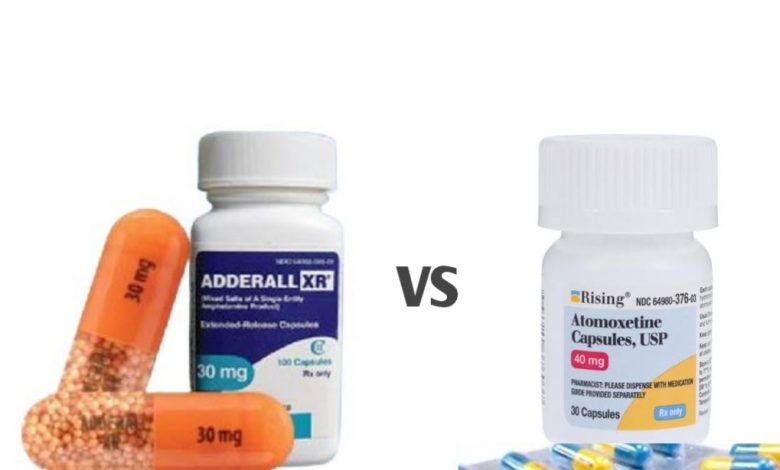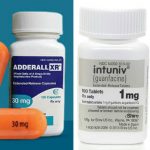Strattera Vs Adderall: Does Strattera give you energy like Adderall?

What is Adderall?
Adderall is a combination of Dextroamphetamine and amphetamine used as part of a treatment program to control symptoms of attention deficit hyperactivity disorder (ADHD; more difficulty focusing, controlling actions, and remaining still or quiet than other people who are the same age).
Adderall is used to treat ADHD in adults and children 3 years of age and older. Adderall XR is used to treat ADHD in adults and children 6 years of age and older. Mydayis is used to treat ADHD in adults and children 13 years of age and older. Adderall is also used to treat narcolepsy (a sleep disorder that causes excessive daytime sleepiness and sudden attacks of sleep) in adults and children 12 years of age and older.
Adderall is in a class of medications called central nervous system stimulants. It works by changing the amounts of certain natural substances in the brain. Adderall also helps to boost energy levels and increase wakefulness, which could help people with narcolepsy, a sleep disorder causing excessive sleepiness. As the drug can boost levels of focus, some people use it to improve their performance in sports and study.
What is Strattera?
Strattera is a brand of atomoxetine, a prescription medication used to treat attention-deficit hyperactivity disorder (ADHD) in children, teenagers, and adults. It belongs to the group of medicines called selective norepinephrine reuptake inhibitors (SNRIs). Drug treatment is the most effective treatment for ADHD as a neurodevelopmental disorder.
Strattera works in the brain to increase attention and decrease restlessness in people who are hyperactive, have problems with concentration, or are easily distracted. This medicine may be used as part of a treatment program that includes social, educational, and psychological treatment.
Strattera is available in 10 mg, 18 mg, 25 mg, 40 mg, 60 mg, 80 mg, and 100 mg capsules.
Does Strattera give you energy like Adderall?
No, Strattera does not give you energy like feel like Adderall. This is because it is a selective norepinephrine reuptake inhibitor (SNRI) and not a stimulant like Adderall which boosts your levels of serotonin, norepinephrine, and dopamine making you experience feelings of euphoria and increased energy levels, as well as possible dangerous physical and emotional side effects.
However, Adderall only provides a short-term boost, not long-term: it gives you a major focus now but has larger effects that may be harder to shake off in the future. Furthermore, Adderall has been shown to be addictive and dependence-forming. As a result, it is said that individuals with past histories of substance abuse should refrain from taking Adderall.
Strattera on the other hand does not have stimulant effects which means it is less likely to be abused or cause dependence, tolerance, or withdrawal symptoms on discontinuation.
Is Strattera as good as Adderall?
Yes, Strattera and Adderall are both effective medication for the management of attention deficit hyperactivity disorder (ADHD) but Adderall tends to be better because it works quickly to relieve symptoms, while Strattera can take several weeks to reach its full efficacy.
Can you take Strattera and Adderall together?
Yes, doctors may prescribe both medications when switching from a stimulant to Strattera, then taper off the stimulant as the Strattera begins to work. Taking the two together during an adjustment period is quite common and is safe.
What are the side effects of Adderall?
Adderall can cause mild or serious side effects. The following list contains some of the key side effects that may occur while taking Adderall. This list doesn’t include all possible side effects.
The more common side effects of Adderall can include:
• anxiety
• constipation
• dizziness
• dry mouth
• headache
• lack of appetite
• nausea
• stomach pain
• trouble sleeping
• weight loss
These side effects may go away within a few days or a couple of weeks. If they’re more severe or don’t go away, talk with your doctor or pharmacist.
Serious side effects
Call your doctor right away if you have serious side effects. Call 911 if your symptoms feel life-threatening or if you think you’re having a medical emergency.
Serious side effects and their symptoms can include the following:
• agitated or aggressive behavior
• blurred vision
• depression
• hallucinations
• heart problems, including high blood pressure, rapid heartbeat, heart attack, and stroke
• impaired or delusional thinking
• irritability
• muscle breakdown called rhabdomyolysis
• severe allergic reaction
What are the other side effects of Strattera?
Common side effects of Strattera include:
• Abdominal pain
• Constipation
• Cough
• Decreased appetite
• Depression
• Dizziness
• Drowsiness
• Dry mouth
• Erectile dysfunction
• Headache
• Hot flashes
• Increases in blood pressure (BP; 15-20 mm Hg or greater) and heart rate (HR; 20 beats/minute or greater)
• Indigestion/heartburn
• Irritability
• Itching
• Menstrual disorder/increased menstrual cramps
• Mood swings
• Nausea
• Sexual side effects (impotence, loss of interest in sex, or trouble having an orgasm)
• Sinus headache
• Skin rash (dermatitis)
• Trouble sleeping (insomnia)
• Upset stomach
• Urinary hesitation or retention
• Vomiting
• Weight loss
Serious side effects of atomoxetine include:
• Depression and depressed mood, anxiety
• Difficulty urinating
• Excess sweating
• Fainting
• Lethargy
• Male pelvic pain, urinary hesitation, or retention in children and adolescents
• Muscle wasting (rhabdomyolysis)
• Numbness or tingling
• QT prolongation, fainting
• Raynaud’s phenomenon
• Reduced sense of touch, numbness, and tingling in children and adolescents, sensory disturbances, tics
• Unusually fast or irregular heartbeat
This is not a complete list of side effects and others may occur. Call your doctor for medical advice about side effects and medication safety purposes. You may report side effects to FDA at 1-800-FDA-1088.





